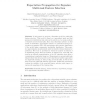Free Online Productivity Tools
i2Speak
i2Symbol
i2OCR
iTex2Img
iWeb2Print
iWeb2Shot
i2Type
iPdf2Split
iPdf2Merge
i2Bopomofo
i2Arabic
i2Style
i2Image
i2PDF
iLatex2Rtf
Sci2ools
136
click to vote
PKDD
2010
Springer
2010
Springer
Expectation Propagation for Bayesian Multi-task Feature Selection
In this paper we propose a Bayesian model for multi-task feature selection. This model is based on a generalized spike and slab sparse prior distribution that enforces the selection of a common subset of features across several tasks. Since exact Bayesian inference in this model is intractable, approximate inference is performed through expectation propagation (EP). EP approximates the posterior distribution of the model using a parametric probability distribution. This posterior approximation is particularly useful to identify relevant features for prediction. We focus on problems for which the number of features d is significantly larger than the number of instances for each task. We propose an efficient parametrization of the EP algorithm that offers a computational complexity linear in d. Experiments on several multi-task datasets show that the proposed model outperforms baseline approaches for single-task learning or data pooling across all tasks, as well as two state-of-the-art...
Related Content
| Added | 29 Jan 2011 |
| Updated | 29 Jan 2011 |
| Type | Journal |
| Year | 2010 |
| Where | PKDD |
| Authors | Daniel Hernández-Lobato, José Miguel Hernández-Lobato, Thibault Helleputte, Pierre Dupont |
Comments (0)

